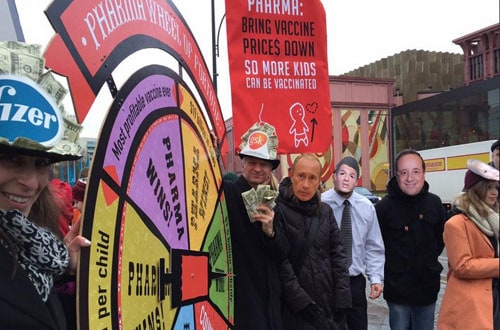
MSF set up ‘Pharma’s Wheel of Fortune’ as a criticism against pharma profits
Pfizer has reduced the price of its pneumococcal vaccine Prevenar 13 for an immunisation programme targeting low-income countries, but has been criticised for not going far enough.
The US pharma giant said it would cut the price of Prevenar 13 offered to the Global Vaccine Alliance (GAVI) by 6% (around 20 cents) to $3.10 per shot, adding that it “understands the importance of ensuring sustainable access to vaccinations.”
That means the three-dose vaccination course will now cost $9.30 rather than $9.90, according to Pfizer, which said at a GAVI conference yesterday that it had committed to the price reduction through 2025.
However, medical charity Medecins Sans Frontieres (MSF) said the reduction was “negligible” and reiterated calls made last week for Pfizer and GlaxoSmithKline (GSK) – which also make a pneumococcal vaccine called Synflorix – to cut the prices they charge even further to $5 per course.
GSK committed to a 10-year price freeze for Synflorix – currently selling at $3.40 per dose – as well as other vaccines provided to GAVI including rotavirus vaccine Rotarix and the human papillomavirus (HPV) shot Gardasil.
“As long-standing supporters of GAVI, we continue to take steps to ensure we are doing what we can to increase access to vaccines,” said the company’s chief executive Sir Andrew Witty.
MSF said a week ago that despite five years of negotiations it had been unable to reach agreement with GSK and Pfizer for the supply of the pneumococcal vaccines at an “affordable price,” and is not swayed by arguments from both companies that the cost of producing the vaccines justifies their current price levels.
The charity – which is campaigning for price reductions on Twitter using the #droptheprice hashtag – said pneumococcal vaccination accounts for about 44% of the total cost of immunising a child in low-income countries and is now 68 times more expensive than it was in 2001, rising from 67 cents to $45.59.
Meanwhile, GlaxoSmithKline and Pfizer have collectively reported over $19bn in global sales for their vaccines, it claimed.
Rohit Malpani, director of policy and analysis for MSF’s Access campaign, said that “a handful of big pharmaceutical companies are overcharging donors and developing countries for vaccines that already earn them billions of dollars in wealthy countries.”
The Serum Institute of India is developing a rival pneumococcal vaccine that could be priced at around $6 per course, although this is not expected to be available for a few years at least.
Other companies making commitments to GAVI at this week’s conference include five-year price freezes for Janssen and Biological E’s pentavalent vaccines and a pledge by Sanofi Pasteur to step up production of its yellow fever vaccine to address current shortages.
The Serum Institute of India is also cutting the price of its pentavalent vaccines, saying the reduction will be worth $50m to GAVI over the next two years.




